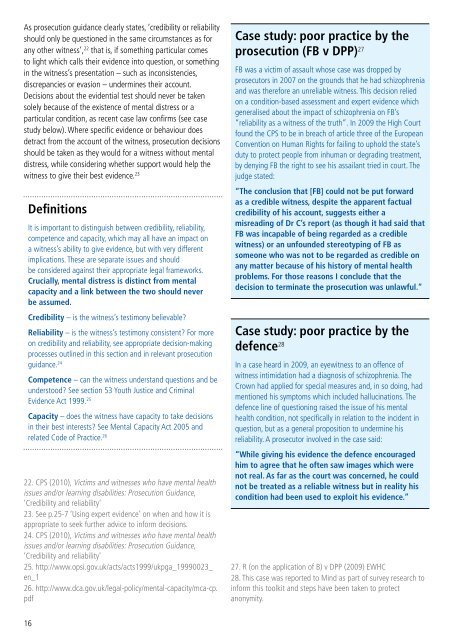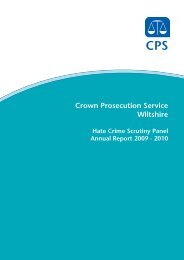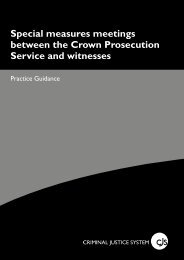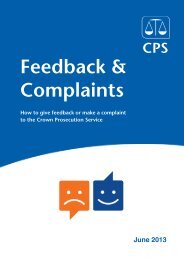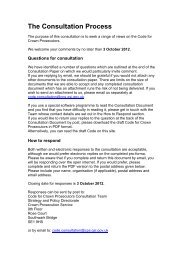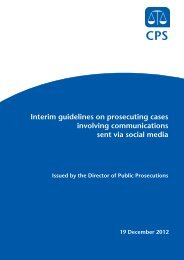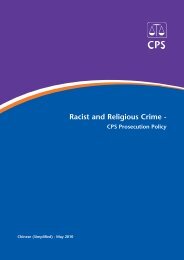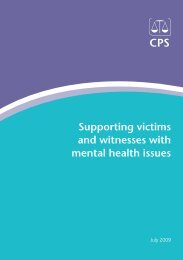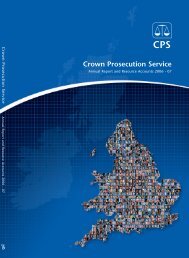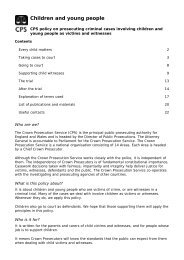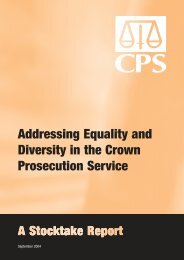Achieving justice for victims and witnesses with mental distress
Achieving justice for victims and witnesses with mental distress
Achieving justice for victims and witnesses with mental distress
Create successful ePaper yourself
Turn your PDF publications into a flip-book with our unique Google optimized e-Paper software.
As prosecution guidance clearly states, ‘credibility or reliabilityshould only be questioned in the same circumstances as <strong>for</strong>any other witness’, 22 that is, if something particular comesto light which calls their evidence into question, or somethingin the witness’s presentation – such as inconsistencies,discrepancies or evasion – undermines their account.Decisions about the evidential test should never be takensolely because of the existence of <strong>mental</strong> <strong>distress</strong> or aparticular condition, as recent case law confirms (see casestudy below). Where specific evidence or behaviour doesdetract from the account of the witness, prosecution decisionsshould be taken as they would <strong>for</strong> a witness <strong>with</strong>out <strong>mental</strong><strong>distress</strong>, while considering whether support would help thewitness to give their best evidence. 23DefinitionsIt is important to distinguish between credibility, reliability,competence <strong>and</strong> capacity, which may all have an impact ona witness’s ability to give evidence, but <strong>with</strong> very differentimplications. These are separate issues <strong>and</strong> shouldbe considered against their appropriate legal frameworks.Crucially, <strong>mental</strong> <strong>distress</strong> is distinct from <strong>mental</strong>capacity <strong>and</strong> a link between the two should neverbe assumed.Credibility – is the witness’s testimony believable?Reliability – is the witness’s testimony consistent? For moreon credibility <strong>and</strong> reliability, see appropriate decision-makingprocesses outlined in this section <strong>and</strong> in relevant prosecutionguidance. 24Competence – can the witness underst<strong>and</strong> questions <strong>and</strong> beunderstood? See section 53 Youth Justice <strong>and</strong> CriminalEvidence Act 1999. 25Capacity – does the witness have capacity to take decisionsin their best interests? See Mental Capacity Act 2005 <strong>and</strong>related Code of Practice. 2622. CPS (2010), Victims <strong>and</strong> <strong>witnesses</strong> who have <strong>mental</strong> healthissues <strong>and</strong>/or learning disabilities: Prosecution Guidance,‘Credibility <strong>and</strong> reliability’23. See p.25-7 ‘Using expert evidence’ on when <strong>and</strong> how it isappropriate to seek further advice to in<strong>for</strong>m decisions.24. CPS (2010), Victims <strong>and</strong> <strong>witnesses</strong> who have <strong>mental</strong> healthissues <strong>and</strong>/or learning disabilities: Prosecution Guidance,‘Credibility <strong>and</strong> reliability’25. http://www.opsi.gov.uk/acts/acts1999/ukpga_19990023_en_126. http://www.dca.gov.uk/legal-policy/<strong>mental</strong>-capacity/mca-cp.pdfCase study: poor practice by theprosecution (FB v DPP) 27FB was a victim of assault whose case was dropped byprosecutors in 2007 on the grounds that he had schizophrenia<strong>and</strong> was there<strong>for</strong>e an unreliable witness. This decision reliedon a condition-based assessment <strong>and</strong> expert evidence whichgeneralised about the impact of schizophrenia on FB’s“reliability as a witness of the truth”. In 2009 the High Courtfound the CPS to be in breach of article three of the EuropeanConvention on Human Rights <strong>for</strong> failing to uphold the state’sduty to protect people from inhuman or degrading treatment,by denying FB the right to see his assailant tried in court. Thejudge stated:“The conclusion that [FB] could not be put <strong>for</strong>wardas a credible witness, despite the apparent factualcredibility of his account, suggests either amisreading of Dr C’s report (as though it had said thatFB was incapable of being regarded as a crediblewitness) or an unfounded stereotyping of FB assomeone who was not to be regarded as credible onany matter because of his history of <strong>mental</strong> healthproblems. For those reasons I conclude that thedecision to terminate the prosecution was unlawful.”Case study: poor practice by thedefence 28In a case heard in 2009, an eyewitness to an offence ofwitness intimidation had a diagnosis of schizophrenia. TheCrown had applied <strong>for</strong> special measures <strong>and</strong>, in so doing, hadmentioned his symptoms which included hallucinations. Thedefence line of questioning raised the issue of his <strong>mental</strong>health condition, not specifically in relation to the incident inquestion, but as a general proposition to undermine hisreliability. A prosecutor involved in the case said:“While giving his evidence the defence encouragedhim to agree that he often saw images which werenot real. As far as the court was concerned, he couldnot be treated as a reliable witness but in reality hiscondition had been used to exploit his evidence.”27. R (on the application of B) v DPP (2009) EWHC28. This case was reported to Mind as part of survey research toin<strong>for</strong>m this toolkit <strong>and</strong> steps have been taken to protectanonymity.16


